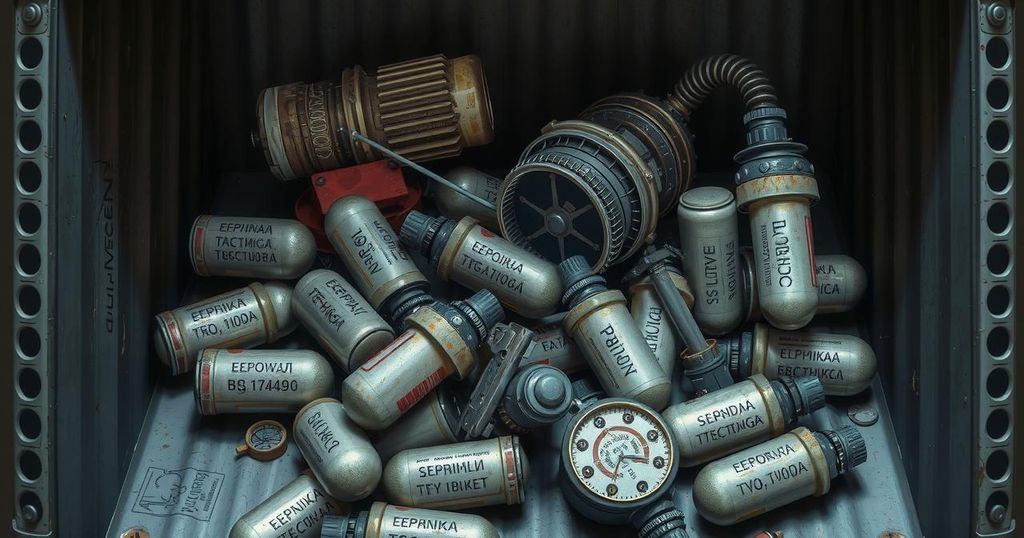World news
ASIA, DEFENCE, DEFENSE, DEFENSE EXPRESS, DEFENSE INTELLIGENCE, DEFENSE INTELLIGENCE OF UKRAINE, ENVIRONMENTAL IMPACT, EUROPE, EUROPE/ASIA, MILITARY, MINISTRY OF DEFENSE OF UKRAINE, MOSCOW, RUSSIA, RUSSIAN INVASION OF UKRAINE, SYRIA, UKRAINE, UKRAINIAN AIR FORCE, WAR
Elena Martinez
0 Comments
Nuclear Capsules in Syria Are Latest Russian Disinformation Tactic
- Russian propaganda is targeting Ukraine again with fabricated claims.
- The focal point is a suspicious container marked with nuclear labels.
- Experts identify the container and its contents as low-effort fakes.
- Dubious claims involve outdated military equipment bought from Ukraine.
- There are connections to past Russian disinformation tactics aimed at Ukraine.
Russian Propaganda’s New Attack on Ukraine Discovered
In a bewildering twist of events, the Defense Intelligence reports that Russian intelligence is pushing out another batch of circular narratives, targeting Ukraine. This time, they have conjured up claims about illicit nuclear material trade purportedly involving Ukrainian military sales. These unfounded allegations are being circulated in Syria and seem to repurpose recycled propaganda, aiming to undermine Ukraine’s standing on the international stage.
Examination Reveals Fabricated Nuclear Capsules
The focus of this dubious narrative centers on a container that supposedly houses nuclear capsules labeled PU.94244U and U.92, indicating they might contain plutonium and uranium. Yet, experts note that the contents remain uncertain and that the labeling itself falls short of the recognized nuclear material handling standards. Defense Intelligence from Ukraine has classified the container as a crude fake, complete with unreadable Cyrillic lettering and a rather haphazardly attached Ukrainian Air Force logo, poorly affixed with blue insulation tape, making the entire setup look like a low-effort prop straight from a surreal play.
Details Suggest a Long-Standing Disinformation Tactic
One particularly dubious element is a capsule marked PU 94244U, which refers to an extremely rare plutonium isotope that, quite frankly, exists in trace amounts on Earth—not exactly something one just stumbles across in a Syrian container. To further dilute any semblance of credibility, a mechanical wristwatch lies within the container, spotlighting just how implausible the operation truly is. Then, there’s an outdated chemical reconnaissance device thrown into the mix, claimed to be bought from Ukrainian military personnel involved in Syria’s radiation and chemical protection efforts. This twists the narrative once more, pulling on threads of past misconceptions about Ukrainian weaponry abroad.
Propaganda Roots Trace Back to Earlier Claims
Notably, a video gagging around this narrative features an Arabic timestamp that reads ‘13.03.2025, Thursday.’ This timestamp appears calculated to lend a sense of urgency and recentness—too calculated, in fact. Defense Intelligence also indicated that both the container and the device appear to be nothing but reused props from previous Russian disinformation campaigns. There’s even record of a private blog run by a user identified as “smoug1985” back in 2023, who aired similar allegations about Ukrainian containers with plutonium. Russian sources subsequently leveraged these old claims to assert they had disrupted Western efforts to blame Russia for chemical weapons use in Syria. Quite the recycling strategy, if one thinks about it.
Call for Global Response Against Russian Tactics
According to Andriy Yusov, a notable figure commenting on the situation, this operation is yet another Kremlin tactic aimed at-damaging Ukraine’s reputation abroad. It’s particularly targeted towards Syria’s newly established leadership and global partners, as well as institutions like the International Atomic Energy Agency. Yusov emphasizes the urgency for an assertive response from the global community, cautioning that this strategy manipulates serious concerns surrounding global nuclear security.
In summary, recent reports reveal that Russian intelligence is once again pivoting to recycled narrative strategies to undermine Ukraine’s reputation. With allegations regarding fictitious nuclear material trade circulating in Syria, this latest disinformation campaign raises genuine concerns. Observers like Andriy Yusov stress that a unified response is essential, especially when the stakes involve global nuclear security and geopolitical positioning.




Post Comment